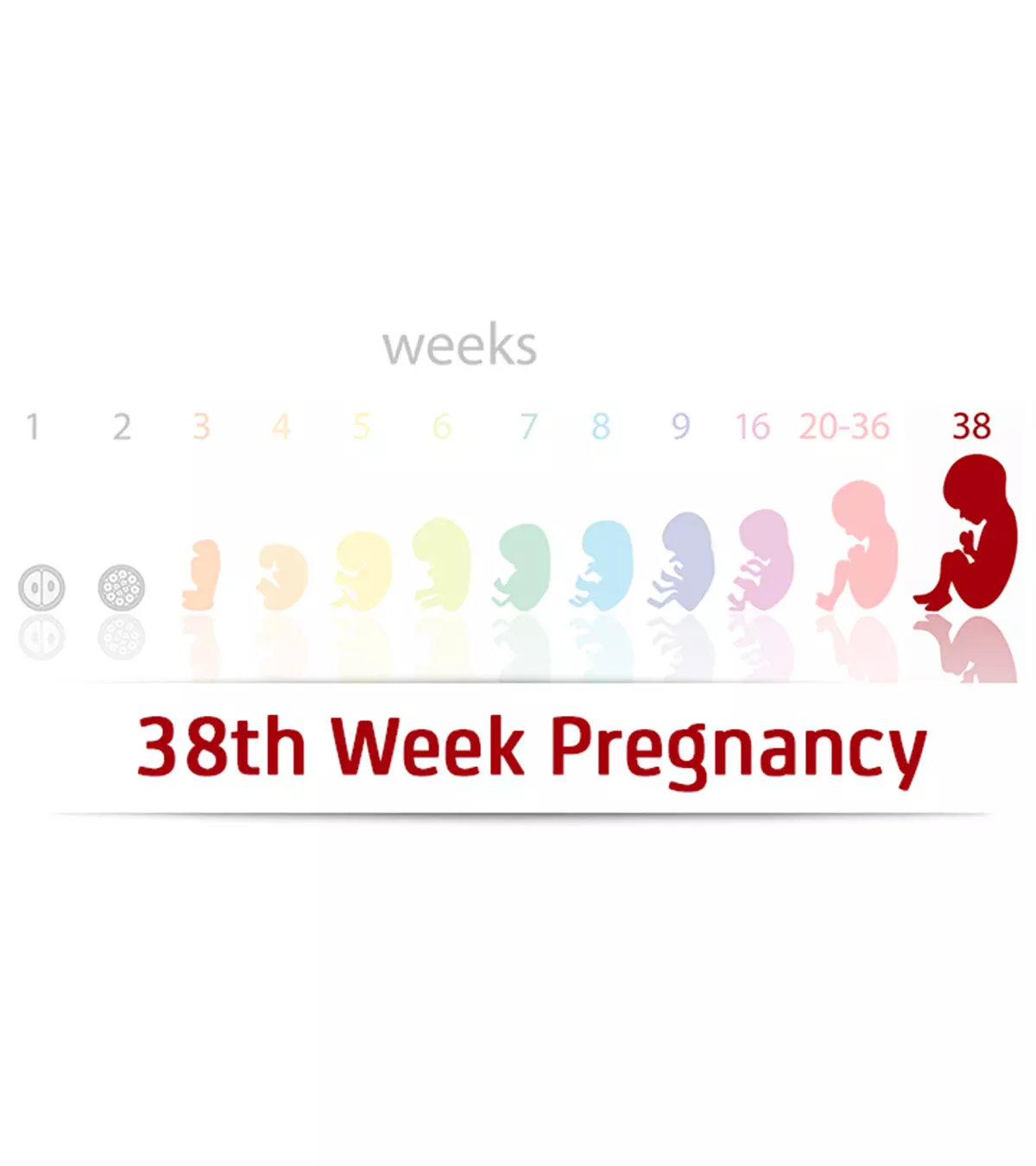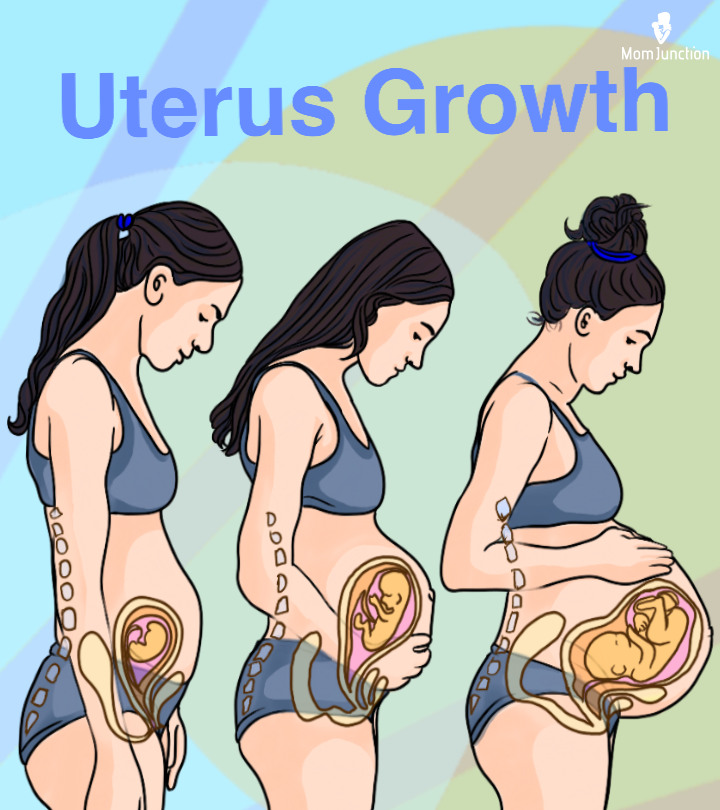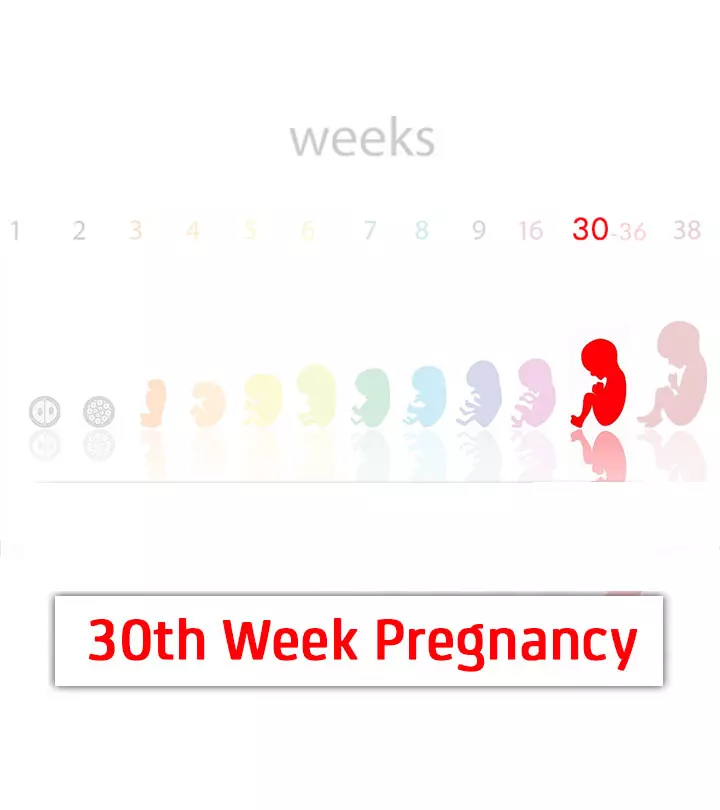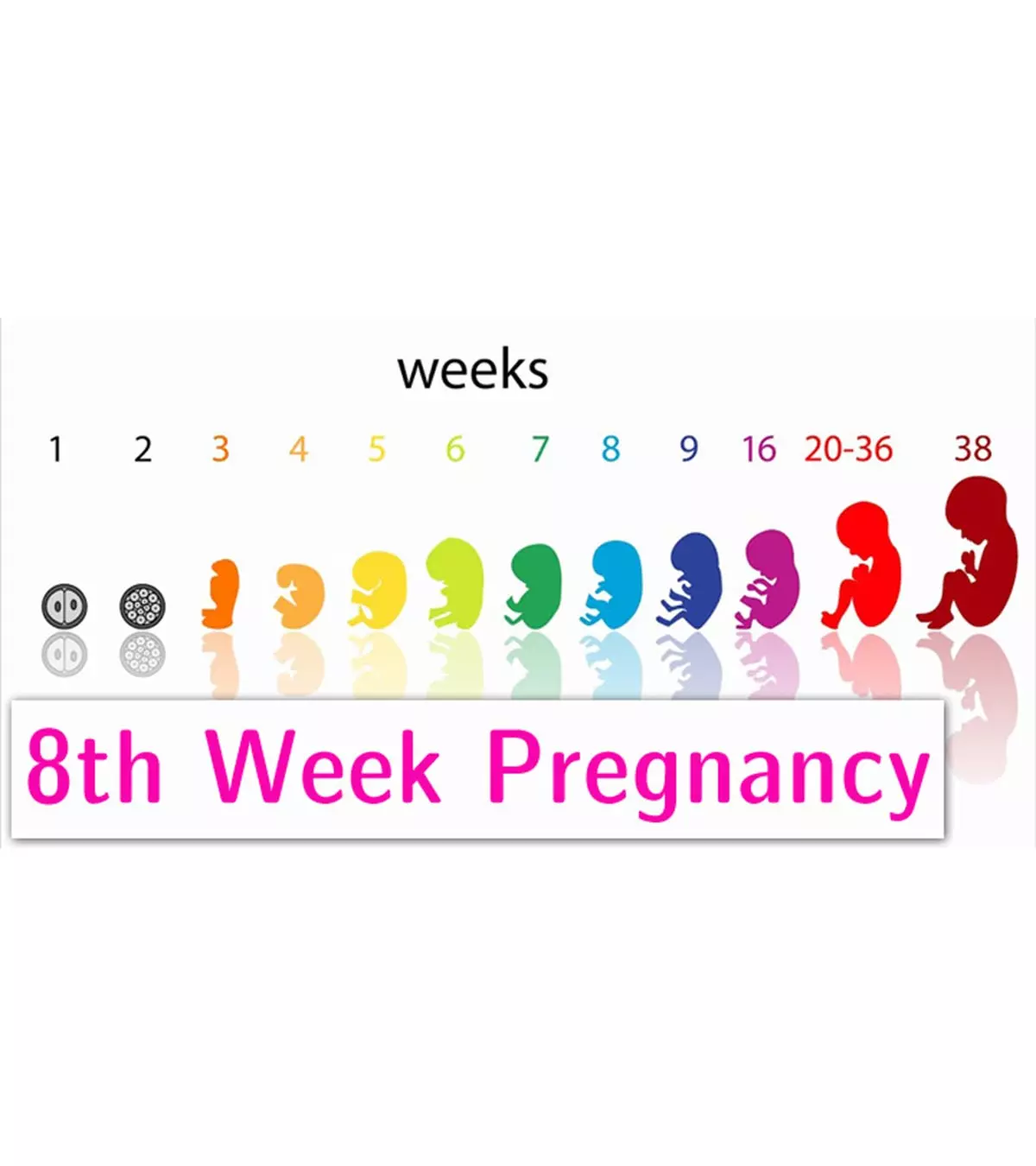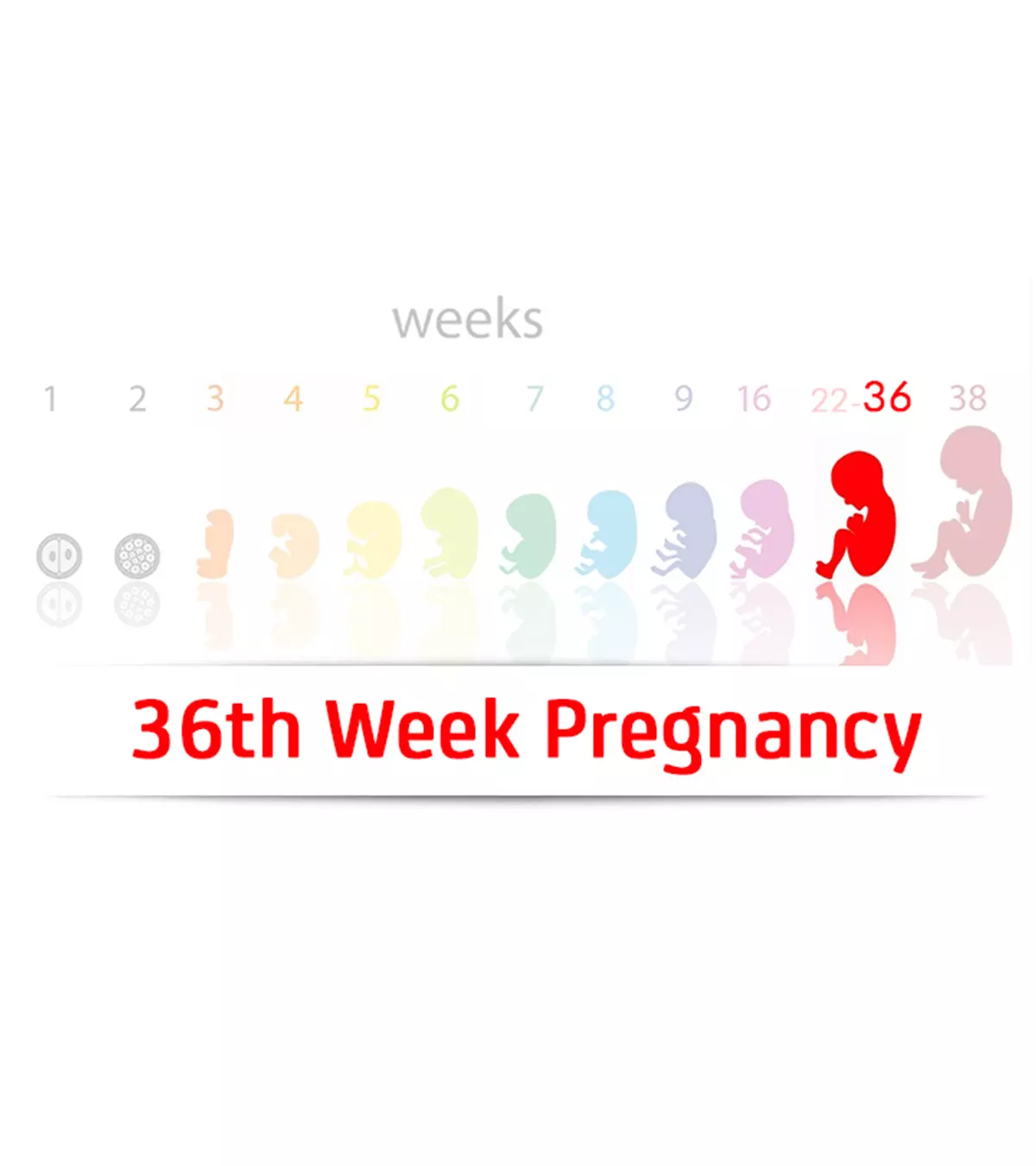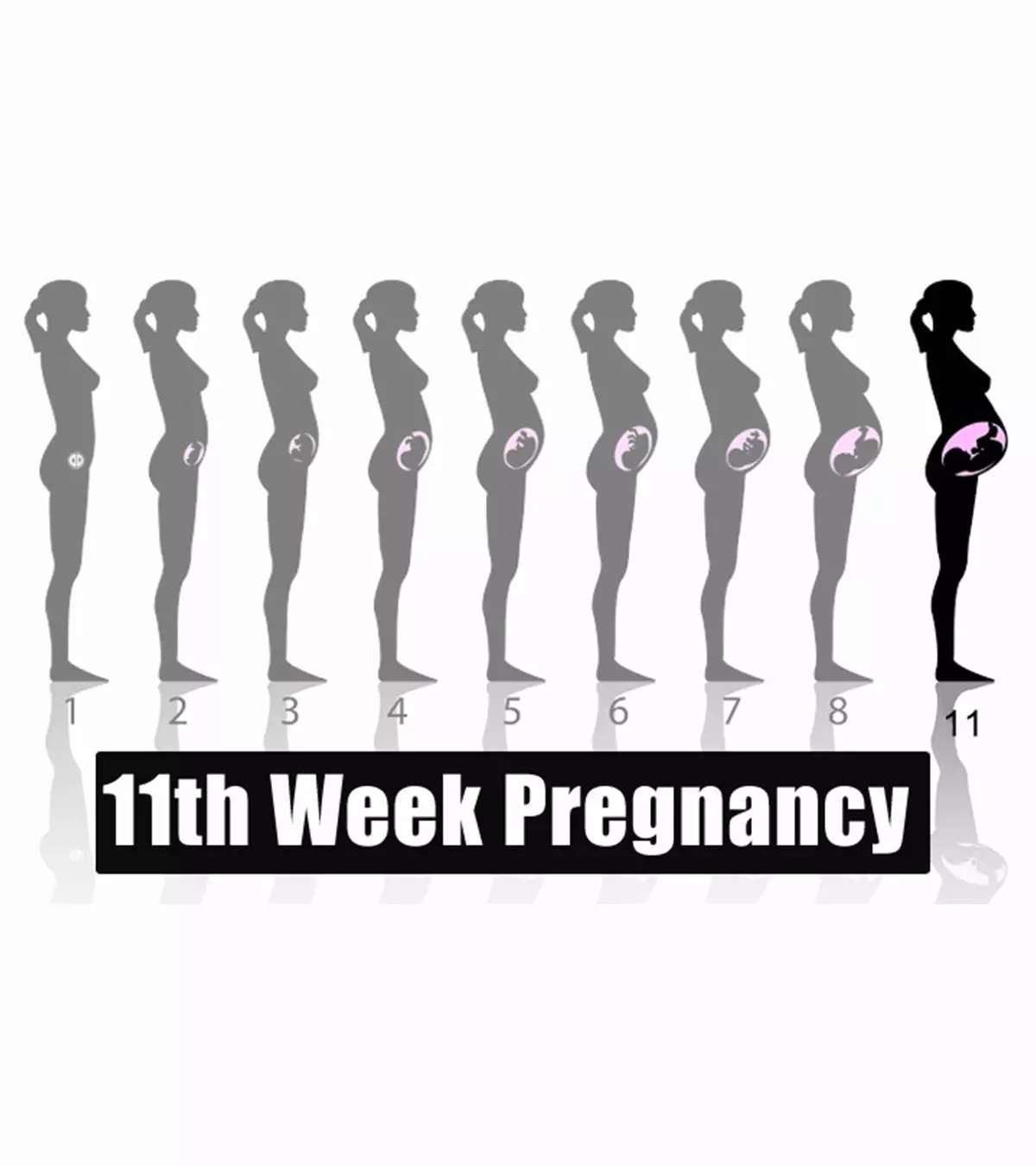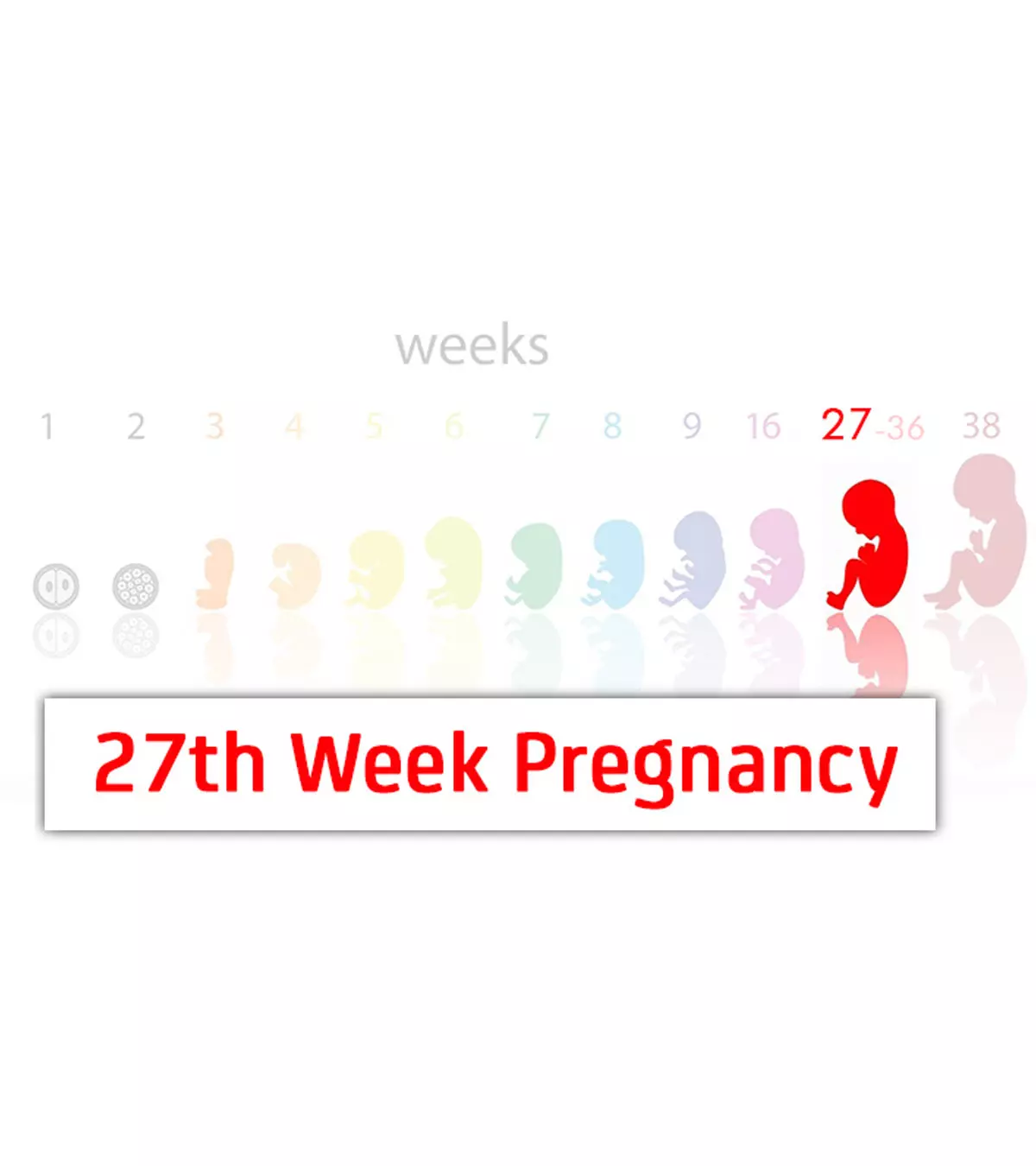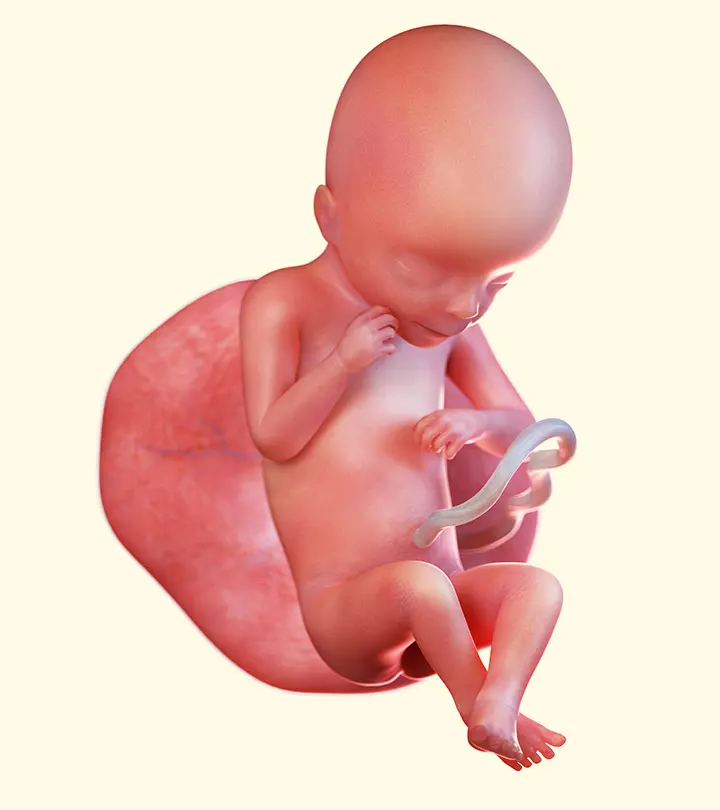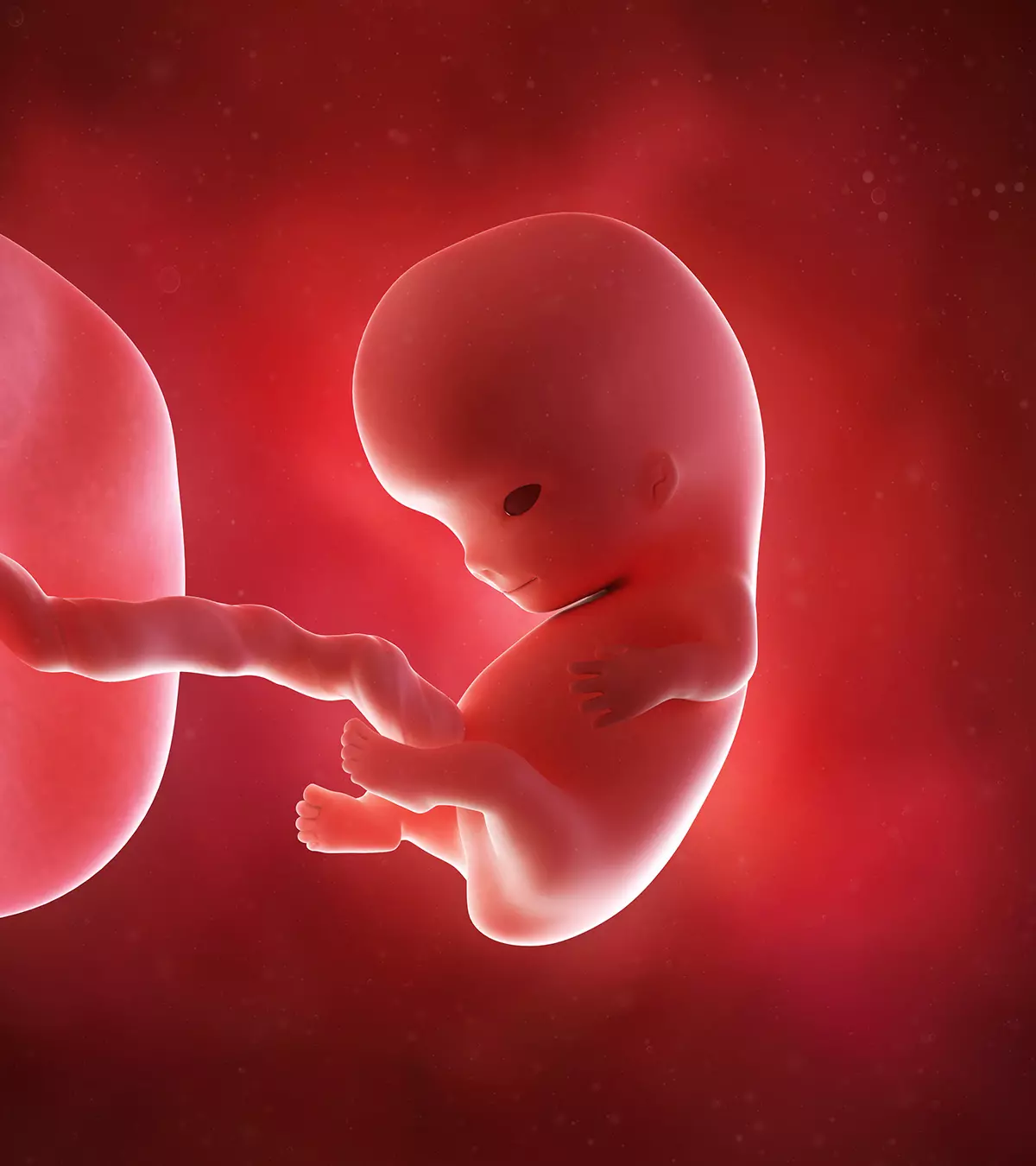
Image: ShutterStock

If you are two months pregnant, you are through 5-8 weeks of pregnancy. It is a pregnancy phase when you will feel almost the same as you did the month before. However, your first prenatal check-up and normal medical check-up should occur during the second month of pregnancy. During the second month, many changes occur inside the body, with cells joining together to form an embryo to your body and mind undergoing several changes. As a result, you will start to feel pregnant in every way. This post covers the body changes, the baby’s growth, and the precautions you should keep in mind throughout the second month of pregnancy.
Key Pointers
- The body undergoes significant changes during the second month of pregnancy, from cells joining to form an embryo to changes in the body and mind.
- Women may experience various symptoms during the second month of pregnancy, including morning sickness, an increased urge to urinate, mood changes, food cravings or aversions, constipation, heartburn, headaches, and dizziness.
- Additionally, some women may experience excessive salivation, a metallic aftertaste, varicose veins, edema, and a heightened sense of smell during this stage.
- Women may also experience bodily changes during this stage of pregnancy, such as aching and tender breasts, thicker white vaginal discharges, skin changes, exhaustion, and others.
- At the second month of pregnancy, the fetus is almost the size of a raspberry, measuring one inch (3cm) in length, and weighs about 1/30 of an ounce (less than 28g).
- To ensure a healthy pregnancy during the second month, it is important to follow a healthy diet, stay hydrated, use supportive bras, rest, and avoid certain activities such as junk food, smoking, alcohol consumption, tight-fitting clothes, stress, and heavy lifting.
What Symptoms Do You Experience In The Second Month Of Pregnancy?
You will experience almost all the symptoms of the first month, plus a few more that make the pregnancy more pronounced. Below are some of the common 2nd-month pregnancy symptoms.
- Morning sickness: Nausea and vomiting of pregnancy (NVP) is common in the first trimester. Researchers from multiple institutes say about 70% of pregnant women experience nausea and vomiting (NVP). You may feel nauseated in the morning as well as other times during the day. Morning sickness begins around the first week and subsides during the second or third month (1).
- Increasing urge to pee: Your trips to the loo increase as your body produces human chorionic gonadotropin (hCG), a hormone that triggers urination. Frequent urination is one of the most common second-month pregnancy symptoms. An increase in fluid intake to meet the needs of the body also causes frequent urination (2).
- Mood swings: You will experience mood swings as the pregnancy hormones start taking control. You will be happy and ecstatic one moment and could become lethargic and irritable the next. These mood changes could also make family and professional responsibilities more stressful and gruesome (3).
 Quick fact
Quick fact- Food cravings/aversions: Hormonal changes along with nutritional deficiencies will lead to aversions or food cravings in pregnancy (2). The foods you loved once may become repulsive, and those you never liked may become your favorite. As long as they are not harmful to you or the baby, you can indulge in all kinds of foods.
- Constipation: Hormonal and physical changes affect the movement of food in the digestive system. The progesterone hormone possesses muscle relaxing properties, which will slow down the digestion process. Also, aversions to foods will affect your food habits that will lead to constipation (4).
- Heartburn: Heartburn is due to increase in progesterone
- Headache and dizziness: Changes in hormone levels and blood pressure during pregnancy will lead to headaches and lightheadedness.
Some women also develop excess salivation, a metallic taste in the mouth, varicose veinsiSwollen, twisted veins that commonly occur in the legs and feet , edemaiSwelling of the body parts from injury or inflammation , and a heightened sense of smell during this period.
Bodily Changes During The Second Month Of Pregnancy
Dr. Kimberly Langdon, a US-based obstetrician/gynecologist, says, “During pregnancy, hormonal changes affect every aspect of an expecting mother’s life. These hormonal changes may cause discomfort at two months. Morning sickness or persistent nausea, bloating, urinary frequency, constipation, and breast tenderness are common complaints among my patients.”
While the baby is going through the initial stages of pregnancy, your body experiences some changes besides the symptoms mentioned above (2) (4) (5).
- Breasts change and become sore and tender to touch. As the hormones increase the fat stores in the body, breasts also increase in size as they prepare for lactation. The nipples and areolas become darker.
- You will notice slight white vaginal secretions that are thicker than usual. They might smell unusual or weird, but these changes are normal.
- Your skin changes and you may develop acne due to the increasing hormonal levels. Some women may have clear skin towards the end of this month, giving them the pregnancy glow.
- Elevated hormonal levels and increase in blood volume bloat your veins making them visible. They appear either red or blue and twisted, a condition called varicose veins.
 Did you know?
Did you know?- You will experience swelling in the arms and legs due to the increased blood supply.
- Fatigue is an early sign of pregnancy and is due to the increased levels of the progesterone hormone that affects blood pressure and blood sugar levels.
- A 2-month pregnant belly may look flat as your uterus is still small. As the baby grows, the uterus expands, resulting in a protruded belly. Although you may experience mild bloating or swelling, there may not be a significant difference in your belly’s appearance in the first two months of pregnancy. An expanding uterus may cause pain and tension in the pelvic area.
- The increased demand for oxygen can cause you to feel short of breath even with mild physical exertion (22).
While you experience these changes, your baby continues to develop and grow in your womb.
Baby’s Development In The Second Month Of Pregnancy
By the second month, the fetus weighs about 1/30 of an ounce (less than 28g) and measures one inch (3cm) in length, almost the size of a raspberry (6) (7). Your 2nd-month pregnant belly will still be the same as before. A two-month pregnant ultrasound shows the first stage of a baby’s existence (8) (9).
- The fetus looks like a curved tube with the head at one end and buttocks on the other end
- The baby may not still look like a human, but their features, such as eyes, external ears, eyelids, and upper lip, have begun to form
- The respiratory organs, such as lungs, nerves, stomach, pancreas, and liver, are rapidly developing
- Fingers and toes develop but are webbed
- Genitals start developing but are not distinguishable
- Arms bend near the elbows
- Spine and kidneys begin to form
- The first muscles that allow fetal movements take shape
- Sensory organs that include ears, optic nerve, tongue, and nose tip continue to develop
- The heart has two chambers
Dr. Langdon observes that a developing fetus’ heart forms between three and six weeks, and a fetal heartbeat can be detected via vaginal ultrasound as early as six weeks (1.5 months) into the pregnancy.
These developments set the foundation for the baby’s health and functionality and contribute to the formation of key organs that will continue developing throughout pregnancy.
 Quick fact
Quick factWhat Do You Need To Know In Your Second Month Of Pregnancy?
Here are a few pointers you need to keep in mind during the 2nd month of pregnancy:
Dos:
- Make a simple to-do list of the precautions and measures to consider, to maintain good maternal health.
- Relax, and take ample rest, since it is crucial for both you and the baby.
- Drink lots of water to stay hydrated.
- Start taking folic acid and prenatal vitamins as prescribed by the gynecologist. They are essential for your baby’s growth.
Some kinds of prenatal vitamins might enhance nausea and vomiting for some women. Tonya, a mother of four talks about the symptoms she experienced at two months pregnant, “The nausea is still an issue and seems to be occurring after I take my prenatal vitamins, so I may ask for a different kind at my next visit (i).”
- Maintain a healthy diet as approved by your doctor or nutritionist, as this will help you both during and post delivery to reduce extra weight.
- Wash fruits and vegetables thoroughly, and peel them if required, to avoid accidental consumption of pesticides.
- Eat small quantities throughout the day as it helps you digest food quickly and aids in feeding your growing baby properly.
- As your breasts show symptoms of heaviness, begin using supportive bras to prevent sagging later.
- Walk at least 20 minutes every day and keep yourself active.
Don’ts:
- Quit smoking and avoid alcohol consumption.
- Do not keep your stomach empty as it promotes the formation of gas and makes you feel nauseated.
- Avoid oily and junk foods as they cause unwanted weight gain.
- Cut down caffeine as it aggravates heartburn, insomniaiA condition in which a person has difficulty falling asleep or staying asleep , and anxiety.
- Do not take any painkillers or antibiotics without consulting your physician.
- Try not to stress yourself out. Enroll yourself in yoga or meditation classes.
- Do not wear tight fitting clothes that restrict breathing space for the body.
- Avoid long-distance travel as it puts unnecessary pressure on the body.
- Avoid hot tub baths and saunas, as high temperatures will affect fetal growth and development.
- Do not bend or lift heavy weights as they put undue stress on the abdomen and lower back.
- Avoid heavy workouts and contact sports that have a risk of abdominal injuries.
- Keep away from pesticides, chemical solvents, and other toxic substances.
- Do not continue working out if you feel fatigued or experience pain and breathlessness (22).
Diet Tips For The Second Month
A well-planned 2nd month pregnancy diet will also help you cope with the many changes happening in your body. You should follow a balanced diet with essential nutrients for healthy fetal development (10).
- Include the right proportions of carbohydrates, fats, protein, vitamins, and minerals to avoid nutritional deficiencies and fatigue.
- Have lots of fresh fruits and vegetables and wash them before consumption to prevent bacterial and viral infections.
- Include folic acid sources such as green leafy vegetables, fruits, eggs, and pulses to prevent embryonic defects.
- Eat fiber-rich foods such as whole grains, cereals, dry fruits, and nuts to stay away from digestive issues
- Drink enough water – pregnant women need to have at least two to three liters of water every day.
- Foods such as spinach, beetroot, fenugreek, dry fruits, chicken and fish provide the iron that is essential for healthy blood supply.
- Have at least five portions of fruits and vegetables every day.
- Avoid meat spreads, raw or undercooked eggs, soft cheeses, and fish containing mercury.
- Avoid having excess tea or coffee, as overindulging in caffeine can be harmful. The safe limit for caffeine consumption is 200mg as obtained from 12 ounces of coffee (22).
- Avoid spicy, acidic, and fatty foods as they ease the symptoms of indigestion and heartburn.
What To Expect During Your Visit To The Ob/Gyn?
This will be your first prenatal visit, and your doctor will perform several routine tests (11).
- Primarily, weight and blood pressure are checked for normalcy. Urine and blood samples are collected for general analysis.
- Urine testing checks for the presence of sugars (sign of diabetes) and protein (sign of kidney infections and hypertensioniA condition that affects the body’s arteries, also known as highblood pressure ).
- Blood test checks for the following:
- Iron and hemoglobiniA protein in red blood cells that is responsible for carrying oxygen to body tissues levels to diagnose anemiaiA condition where the body lacks red blood cells to transport oxygen to body tissues
- ABO blood grouping and Rh factor
- Infectious diseases such as hepatitisiAn inflammatory condition of the liver commonly caused by viral infections B and HIV
- Immunities such as chicken pox and rubellaiA viral infection also known as German measles that causes rash and fever
- Genetic conditions that include sickle cell anemiaiA genetic blood disorder in which abnormal hemoglobin formations lead to severe pain and organ damage or thalassemiaiA genetic blood disorder that affects the production of hemoglobin, leading to anemia and other complications
- Complete body check-up to analyze any ENT, dental, thyroid or other problems.
- Vaginal smear examination to diagnose vaginal infections.
- Physical examination for edema and varicose veins.
Discuss any concerns with your doctor and ask questions. Use your first prenatal check-up to clear as many doubts as you have to become stress-free.
 Quick fact
Quick factWhat Are The Common Concerns During The Second Month?
The second month is when the fetus starts to develop, and rapidly too. But it is also a delicate phase of pregnancy when you need to be extra observant for the concerns common at this time.
- Vaginal spotting or bleeding that could be a result of implantation bleeding, intercourse or early miscarriage.
- Varicose veins, which are swollen and visible above the skin. They become worse with successive pregnancies.
- Heartburn and indigestion are common, due to changes in the hormone levels.
- Risk for gestational diabetes due to improper production and utilization of glucose and insulin.
- Risk of hypertension due to the increasing demands for blood to supply oxygen and nutrients to the baby (23).
- You are likely to contract external infections because of the many changes in the body.
Tips For Dads-To-Be
This is a vulnerable time, with mood swings and nausea making you more irritable. Seek your partner’s help to make this time more agreeable for you. Your partner can:
- Help with household chores, especially those involving heavy lifting and house cleaning solutions to prevent abdominal pressure and toxin exposure.
- Keep track of your eating and sleeping habits.
- Stock the pantry with the foods you love to eat around this time.
- Research about insurance coverage and other medical details.
- Be supportive and make you feel loved to keep your stress levels minimal.
- Help avoid substance use and stay clean themselves to ensure you are well cared for.
- Assist with exercising by ensuring you keep a steady pace and stay hydrated (22).
Frequently Asked Questions
1. Can pregnancy start showing at two months?
A baby bump does not appear at two months. It starts showing between 13 and 17 weeks. However, an expanded abdomen may be indicative of bloating (16).
2. Can a baby kick at eight weeks?
A baby’s limbs have just begun to develop at two months. The fetal movement begins around 16 to 18 weeks and kicks strongly in the sixth month, which starts around 23 weeks (16).
3. Can a woman exercise at two months pregnant? If so, what kind of exercise is safe?
Yes, women can exercise during pregnancy. You may get a clearance from your doctor for exercising during pregnancy. Once you are cleared for exercise, you may incorporate 30 mins of exercise into your routine. Some generally safe exercises are walking, swimming, yoga, and pilates (17).
4. How much weight should a woman gain during the second month of pregnancy?
Women usually should gain two to four pounds during their first trimester of pregnancy (18).
5. Can a woman still work during the second month of pregnancy?
Yes, women can work during the second month of pregnancy without problems. However, pregnancy causes many changes in the body, and hence your ability to continue working will largely depend on the type of job you have and the hours you work. Taking advice from a healthcare professional in such situations is advisable (19).
6. What are some ways a woman can alleviate morning sickness at two months pregnant?
Some ways to help alleviate morning sickness include eating small and frequent meals, taking ginger and vitamin B6 supplements, avoiding spicy foods, and drinking lots of water. However, if the condition worsens, contact your healthcare provider immediately (20).
7. What is the likelihood of a miscarriage at two months pregnant?
Most of the miscarriages, around 80%, happen during the first trimester, before the 12th week of pregnancy (21).
8. What should I avoid during the second month of pregnancy?
To ensure a safe and healthy pregnancy, avoid smoking and alcohol consumption, and reduce your caffeine intake, as these can affect fetal development. Also, steer clear of raw or undercooked meats and fish with high mercury levels.
9. Is it normal to have no symptoms at 2 months pregnant?
Yes, it is quite usual for some people not to notice any significant symptoms apart from a missed period during the early stages of pregnancy. People with irregular periods may also miss the lack of their monthly bleeding and attribute other milder symptoms to other causes. For instance, you may attribute nausea or heartburn to indigestion or food intolerance. This may be especially true for stealth or cryptic pregnancies (24) (25).
At two months pregnant, you are still at the beginning of your pregnancy and are likely to deal with many more changes ahead. So follow the maternal care and diet instructions to keep yourself and the baby safe. Relax and stay away from anything stressful. Taking the right measures will make the journey happier and healthier.
Do you have any experiences to share? Let us know in the comment section below.
Infographic: What Do You Need To Know In Your Second Month Of Pregnancy?
During the second month of pregnancy, the fetus develops crucial organs, such as the brain, spinal cord, and heart. Expectant mothers can take steps to promote the health and well-being of their babies during this time. The infographic below provides a few essential recommendations to follow. Take a moment to read through and share the information with others who may benefit from it.
Some thing wrong with infographic shortcode. please verify shortcode syntax
Illustration: 2 Months Pregnant : Symptoms Baby Development And Diet Tips

Image: Dall·E/MomJunction Design Team
Personal Experience: Source
MomJunction articles include first-hand experiences to provide you with better insights through real-life narratives. Here are the sources of personal accounts referenced in this article.
i. 2 months pregnant!!; https://thesweatmanfamily.blogspot.com/2008/06/2-months-pregnant.htmlReferences
1. Morning sickness; Pregnancy, Birth and Baby; Healthdirect Australia (2018)
2. Pregnancy – signs and symptoms; Better Health Channel
3. Carin Modh et al.; First time pregnant women’s experiences in early pregnancy; Int J Qual Stud Health Well-being (2011)
4. Stages of pregnancy; U.S. Department of Health and Human Services (2018)
5. Signs and symptoms of pregnancy; National Health Service (NHS) (2019)
6. Fetal Development: Stages of Growth; Cleveland Clinic
7. Week-by-week guide to pregnancy; NHS
8. Pregnancy by Trimester; University of California, Santa Barbara
9. Fetal development; MedlinePlus (2019)
10. Prenatal Nutrition; Michigan Medicine, University Of Michigan (2017)
11. Prenatal care in your first trimester; Medline Plus, NIH (2018)
12. Mood Swings During Pregnancy; American Pregnancy Association
13. Varicose veins; Australian Government
14. Baby Development Month By Month; American Pregnancy Association
15. Prenatal Care Checkups; March Of Dimes
16. You And Your Baby: Month-By-Month; University of Illinois Hospital
17. Pregnancy and Exercise; Better Health Channel
18. Managing your weight gain during pregnancy; Medline Plus, NIH
19. Work and pregnancy; Stanford Medicine
20. Five ways to decrease nausea during pregnancy; University of Iowa Hospitals and Clinics
21. Miscarriage; March of Dimes
22. First Trimester; Cleveland Clinic
23. What are some common complications of pregnancy?; Eunice Kennedy Shriver National Institute of Child Health and Human Development
24. How to know when you are pregnant; Tommy’s
25. Cryptic Pregnancy; Cleveland Clinic
Community Experiences
Join the conversation and become a part of our nurturing community! Share your stories, experiences, and insights to connect with fellow parents.
Read full bio of Dr. Richa Hatila Singh
- Dr. Kimberly Langdon is a gynecologist with 19 years of experience wherein she delivered more than 2,000 babies. She is currently working as vice-president, product development and research at Physician Integrative Laboratories in the US. She did her doctor of medicine from the Ohio State University.
 Dr. Kimberly Langdon is a gynecologist with 19 years of experience wherein she delivered more than 2,000 babies. She is currently working as vice-president, product development and research at Physician Integrative Laboratories in the US. She did her doctor of medicine from the Ohio State University.
Dr. Kimberly Langdon is a gynecologist with 19 years of experience wherein she delivered more than 2,000 babies. She is currently working as vice-president, product development and research at Physician Integrative Laboratories in the US. She did her doctor of medicine from the Ohio State University.
Read full bio of Rebecca Malachi
Read full bio of Swati Patwal
Read full bio of Aneesha Amonz





